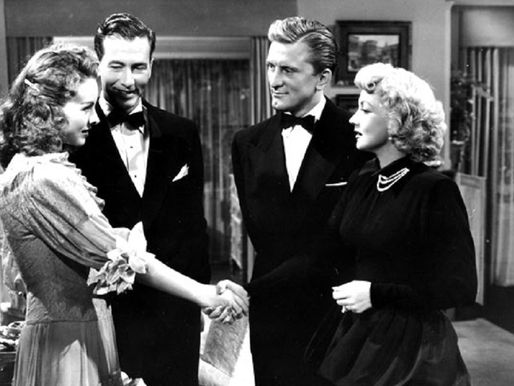top of page
Search
Comedy
Classic Comedy Films from 1930 - 1999


Superman 2 (1980)
Superman II is widely regarded as one of the finest superhero films of the pre-Batman (1989) era and a landmark in the evolution of comic book adaptations. Serving as a direct sequel to Richard Donner’s Superman: The Movie (1978), this follow-up deepens the emotional core of its predecessor while raising the stakes with new antagonists—General Zod and his fellow Kryptonian criminals.

Soames Inscker
5 min read


The Heartbreak Kid (1972)
The Heartbreak Kid (1972) is a landmark of American dark comedy, a film that balances pathos and satire with unnerving precision. Directed by Elaine May and written by Neil Simon—adapting Bruce Jay Friedman’s short story “A Change of Plan”—this is not your average romantic comedy.

Soames Inscker
5 min read


National Lampoons Animal House (1978)
National Lampoon’s Animal House (1978) isn’t just a movie—it’s a cultural milestone. Directed by John Landis and co-written by comedy legends Harold Ramis and Douglas Kenney, the film marked the big-screen debut of the National Lampoon brand and redefined college comedy for a generation.

Soames Inscker
5 min read


A Letter to Three Wives (1949)
A Letter to Three Wives (1949) is a gem of mid-century American cinema, blending drama, satire, and subtle psychological insight with elegant storytelling and razor-sharp dialogue.

Soames Inscker
5 min read


Funny Face (1957)
Funny Face (1957) is a visually sumptuous and musically charming romantic comedy-musical directed by Stanley Donen, starring Audrey Hepburn, Fred Astaire, and Kay Thompson. Loosely based on the 1927 stage musical of the same name.

Soames Inscker
4 min read


Life With Father (1947)
Life with Father is one of the most beloved family comedies of classic Hollywood—a Technicolor jewel that blends wit, warmth, and an idealized vision of late 19th-century domestic life.

Soames Inscker
4 min read


Theodora Goes Wild (1936)
Theodora Goes Wild is a seminal screwball comedy from the golden age of Hollywood that helped redefine Irene Dunne’s screen image. Known until then primarily for musical and dramatic roles, Dunne stunned audiences with her sparkling comedic talent, earning her an Academy Award nomination for Best Actress.

Soames Inscker
4 min read


Cluny Brown (1946)
Cluny Brown is one of those rare comedies that’s both effervescent and quietly radical. Directed by Ernst Lubitsch, in what would tragically be his last completed film, it is a parting gift of lightness laced with sharp social critique.

Soames Inscker
4 min read


To Be or Not to Be (1942)
Few films have dared to laugh in the face of tyranny with the audacity, intelligence, and finesse of Ernst Lubitsch’s To Be or Not to Be. Released in March 1942, during the darkest early days of World War II, the film stands as a singular achievement in cinematic satire—a work that blends comedy with political critique in a manner that feels both subversive and human.

Soames Inscker
4 min read


The Shop Around the Corner (1940)
The Shop Around the Corner is not just one of the most delightful romantic comedies ever made—it’s also a quiet masterclass in tone, character, and storytelling. Directed by the inimitable Ernst Lubitsch, it exemplifies his famed “Lubitsch Touch”: the light-handed, witty, emotionally intelligent style that could blend comedy and heartbreak with unparalleled grace.

Soames Inscker
4 min read


Ninotchka (1939)
Released at the tail end of the 1930s, Ninotchka marks a pivotal moment in both film history and star image. It is most often remembered as “Garbo laughs”—a reference to the publicity campaign heralding Greta Garbo’s transformation from enigmatic diva to sparkling comedienne. But beyond this famous tagline lies a film of exceptional intelligence and charm, one that critiques authoritarianism and capitalism alike while weaving a tender, deeply human love story.

Soames Inscker
4 min read


Trouble in Paradise (1932)
Ernst Lubitsch’s Trouble in Paradise is a masterwork of wit, elegance, and charm—arguably one of the most perfectly executed romantic comedies in cinema history. Released in 1932, before the enforcement of the Hays Code, the film is imbued with a gleeful irreverence and a frankness about sex, class, and morality that would soon vanish from American screens for decades.

Soames Inscker
4 min read


The Moon is Blue (1953)
When The Moon Is Blue was released in 1953, it caused a seismic stir—not because of any wild visual spectacle or ground-breaking technical achievement, but due to its script. This modest romantic comedy made headlines for its frank (by 1950s standards) treatment of courtship, chastity, and feminine assertiveness.

Soames Inscker
3 min read


Going My Way (1944)
Released during the final years of World War II, Going My Way (1944) is a classic example of a film that blends humour, sentimentality, and musicality to create a lasting emotional impact.

Soames Inscker
6 min read


Ruggles of Red Gap (1935)
Ruggles of Red Gap (1935) is a charming and whimsical comedy that represents a delightful intersection of British and American sensibilities in film during the mid-1930s.

Soames Inscker
6 min read


Trading Places (1983)
The premise is simple but potent: two wealthy, manipulative brothers—Duke & Duke (Don Ameche and Ralph Bellamy)—make a bet to see whether a person’s character is shaped more by nature or nurture. To test their theory, they orchestrate a life-swap between two men at opposite ends of the socioeconomic spectrum.

Soames Inscker
3 min read


Beverley Hills Cop (1984)
When Beverly Hills Cop was released in 1984, it didn’t just cement Eddie Murphy as a major Hollywood star—it helped redefine what an action-comedy could be. Equal parts crime thriller and laugh-out-loud comedy, the film captured the zeitgeist of the 1980s, blending gritty urban realism with the sun-soaked gloss of Beverly Hills, all anchored by Murphy’s dynamic, high-voltage performance.

Soames Inscker
3 min read


Driving Miss Daisy (1989)
Driving Miss Daisy is a quiet, character-driven film set in the American South, spanning the years from the late 1940s to the early 1970s. At its heart, it is the story of an unlikely friendship between Daisy Werthan, a fiercely independent, aging Jewish woman from Atlanta, and Hoke Colburn, her African American chauffeur.

Soames Inscker
4 min read


The Nutty Professor (1963)
The Nutty Professor (1963) is not only one of Jerry Lewis’s most iconic films but also a defining work in American comedy. Co-written, directed by, and starring Lewis, the film serves as a loose parody of Robert Louis Stevenson’s Strange Case of Dr. Jekyll and Mr. Hyde, filtered through Lewis’s unique brand of slapstick, pathos, and satire. It blends outlandish physical humour with a surprisingly poignant story about identity, self-esteem, and the cost of conformity.

Soames Inscker
5 min read


Silver Streak (1976)
Silver Streak (1976) is a delightful blend of comedy, action, romance, and mystery—an ambitious cinematic cocktail that helped establish the buddy-action formula that would flourish in the 1980s. Directed by Arthur Hiller and written by Colin Higgins (Harold and Maude, Foul Play), this film stands as a mid-’70s crowd-pleaser that combines Hitchcockian intrigue with slapstick humour and sly social commentary.

Soames Inscker
5 min read
bottom of page


